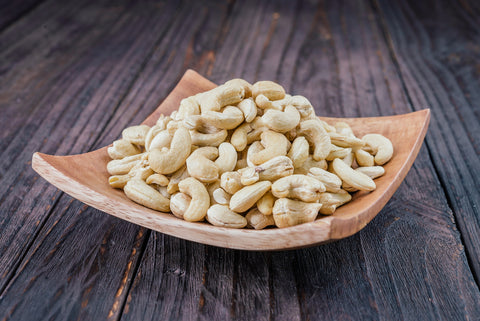EAT THESE 5 NUTS FOR HEALTHIER LIFESTYLE

Are you seeking nutritious snack options? Snacks offer a satisfying solution for hunger and promote well-being. Nuts are rich in good fats, vitamins, fiber, and protein. They include monounsaturated and polyunsaturated fats, making them an excellent choice.
Did you know different nuts offer unique health benefits? Adding nuts to your daily routine can protect against high blood pressure and cholesterol. Research indicates nut consumption extends lifespan, supported by numerous studies. Interested in the best nuts for health? We have the answer.
Explore '5 Nuts for a Healthier Lifestyle.' Summertime is perfect for a relaxing read. Imagine sipping iced coffee on the balcony while perusing this concise article. It's sure to rejuvenate you.
Top 5 Nuts For Better Health
ALMONDS

When we talk about nuts, we cannot miss almonds. Almonds have gained popularity in recent years.
A handful of almonds contain:
- Calories: ~161 Cal
- Fat: ~ 14 gm Fat
- Protein: ~ 6 gm Protein
- Carbs: ~ 6 gm Carbs
- Fiber: ~ 3.5 gm Fiber
- Vitamin E: ~ 37% of RDI
- Magnesium: ~ 19% of RDI.
Health Benefits of Regular Almond Consumption:
- Studies confirm that an almond-rich diet reduces LDL, total cholesterol, and oxidized LDL, all detrimental to heart health.
- Almonds, being low-calorie, aid weight loss effectively.
- For those grappling with high blood sugar, almonds mitigate the risk and assist in maintaining healthier levels.
- In type 2 diabetes patients, almonds exhibit anti-inflammatory properties.
- Additionally, almonds foster the growth of beneficial gut bacteria, promoting overall gut health.
- Rich in antioxidants, almonds act as formidable shields against aging and diseases, including cancer.
For a healthier snack alternative to chips or pretzels, consider almonds.
PEANUTS

Do you possess knowledge of enhancing your protein intake? Consider incorporating peanuts into your diet, a convenient and accessible means to boost protein consumption.
100g of peanuts contains the following nutrients.
- Protein: ~ 25.80 gm
- Calories: ~ 567
- Fat: ~ 49.24 gm
- Carbs: ~ 16.13 gm
- Fiber: ~ 8.5 gm
- Sugar: ~ 4.72 gm S
Health Benefits of Peanuts
- Peanuts offer abundant polyphenols, antioxidants, flavonoids, and amino acids, supporting good health.
- They diminish bad cholesterol, curbing heart disease risk, and impede clotting, reducing heart attack chances.
- Peanuts, rich in protein, aid weight control by inducing fullness with fewer calories.
- Regular peanut consumption moderates blood sugar levels, reducing the likelihood of diabetes onset.
- Numerous studies suggest peanuts can help prevent a specific stomach cancer type.
The myriad health benefits of peanuts indeed merit attention. Roast, salt, and savor as a wholesome evening snack.
WALNUTS

A hard-shelled nut, such as walnuts, is a rich source of alpha-linolenic acid (ALA), an omega-3 fatty acid. However, walnuts are calorie-dense due to their high fat content, which also provides significant protein and nutrients.
Nutrient content in 100g of walnuts:
- Protein: ~ 15.23 gm
- Fat: ~ 65.21 gm
- Carbohydrate: ~ 13.71 gm
- Fiber: ~ 6.7 gm
- Sugar: ~ 2.61 gm
- Calcium: ~ 98 mg
- Iron: ~ 2.91 mg
- Magnesium: ~ 158 mg
- Phosphorus: ~ 346 mg
- Potassium: ~ 441 mg
Health Benefits of Walnuts
- Walnuts serve as a significant antioxidant source, aiding in averting oxidative harm, including that from "harmful" LDL cholesterol.
- Walnuts bolster cardiac well-being due to their omega-3 fatty acid content.
- Walnuts, rich in diverse nutrients, mitigate inflammation, a common factor in numerous chronic illnesses.
- Walnuts foster gastrointestinal health.
- Walnuts potentially diminish cancer risk.
You can have walnuts as a snack or have them early in the morning.
CASHEWS

Cashews are a well-known name in the Indian kitchen. They are a great source of iron. So people should add cashews to their everyday diet.
Cashews have the following nutrients:
Protein: 18.22 gm
Fat: 43.85 gm
Carbs: 30.19 gm
Fiber: 3.30 gm
Sugar: 5.91 gm
Health Benefits of Cashews
- Numerous studies show the cardioprotective benefits of cashews.
- Cashews aid in managing hypertension among individuals with high BP.
- Cashews serve as an effective immunity enhancer.
- They facilitate the regulation of weight to prevent excessive gain.
- Additionally, they contribute to fortifying bone health.
PISTACHIOS

The final entry is Pistachios, renowned for their protein and other vital nutrients.
Pistachios (100g) contain the following:
- Protein: 100g of Pistachios have 20.16 g of protein
- Fat: 100g of Pistachios have 45.32 g of fat.
- Carbohydrate: 100g of Pistachios have 27.17 g of carbohydrate
- Fiber: 100g of Pistachios have 10.60 g of fiber.
- Sugar: 100g of Pistachios have 7.66 g of sugar.
- Calories: 100g of Pistachios have 560 calories.
Health Benefits of Pistachios
- Pistachios abound in antioxidants, vital for health.
- They offer fewer calories but more protein than other nuts.
- Incorporating pistachios aids weight loss and promotes mindfulness.
- High-fiber pistachios benefit gut bacteria.
- Consuming pistachios reduces blood cholesterol levels

We're sure this article has made clear to you why to eat nuts. Nuts represent an ideal snack choice, superior to alternatives such as chips and other less nutritious options. It is advisable not to limit your selection to a single type; given that nuts are minimally processed and devoid of additional additives, it is prudent to blend a variety of raw, unsalted nuts for a wholesome evening indulgence.
"Embrace the consumption of nuts to avail yourself of a diverse array of nutrients and antioxidants."
Authored by: Vijeta Rana
About the Author: Vijeta Rana is a Wellness and Fitness Blogger from Punjab, India


@Bhaskar, every type of nuts has different nutritional value and hence should be consumed in different amounts. However, to provide you with an idea, if you eat a mixture of various nuts, a handful of them in a day should suffice.
Thank you for the info regarding nuts. Can you please suggest how many nuts we should consume regularly.
Leave a comment